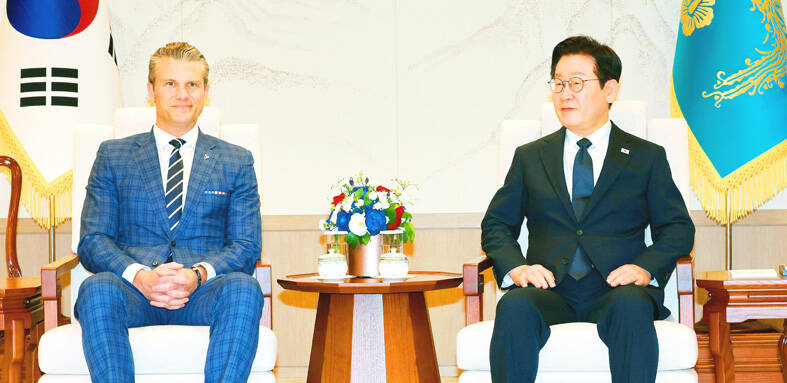South Korea is to triple spending on artificial intelligence (AI) and make its biggest defense budget increase in six years, President Lee Jae Myung said yesterday in his annual parliamentary budget speech.
The South Korean president said 10.1 trillion won (US$7 billion) would go toward “a major transformation aimed at propelling the nation into the ranks of the world’s top three AI powers” alongside the US and China.
“We will significantly expand investment to usher in the ‘AI era,’” he said, adding that the amount was more than three times this year’s AI-related budget.

Photo: EPA
The proposal was made in a speech outlining his government’s spending plans for next year. Overall, the budget plan totals 728 trillion won, an 8.1 percent increase from this year.
Lee needs parliament to pass the budget proposal, which is likely given his party’s majority.
On the defense budget, the president said his government wants to see an 8.2 percent increase from this year to 66.3 trillion won.
If passed, it would mark the highest defense spending increase since 2019.
“We will overhaul conventional weapons systems into state-of-the-art systems suited for the AI era and swiftly transform our military into an elite, smart force,” Lee said.
Praising Seoul’s plan to raise military spending, US Secretary of Defense Pete Hegseth said that the Asian ally would take a larger role in defending itself from North Korean aggressions as the allies must brace for “regional contingencies.”
After annual security talks with South Korean Minister of National Defense Ahn Gyu-back in Seoul, Hegseth told reporters that he was “greatly encouraged” by Seoul’s commitment to increase defense spending and make greater investments in its own military capabilities.
He said the two agreed the investments would bolster South Korea’s ability to lead its conventional deterrence against North Korea.
Hegseth highlighted defense cooperation on repairing and maintaining US warships in South Korea, saying the activities harness South Korea’s world-class shipbuilding capabilities and “ensure our most lethal capabilities remain ready to respond to any crisis.”
“We face, as we both acknowledge, a dangerous security environment, but our alliance is stronger than ever,” he said.
Hegseth said the US-South Korea alliance is primarily aimed at coping with potential North Korean provocations, but must also keep other regional threats in view.
“There’s no doubt flexibility for regional contingencies is something we would take a look at, but we are focused on standing by our allies here and ensuring the threat of the DPRK [North Korea] is not a threat to the Republic of Korea [South Korea] and certainly continue to extend nuclear deterrence as we have before,” he said.
DPRK stands for the Democratic People’s Republic of Korea — North Korea’s official name — while Republic of Korea is South Korea’s formal name.